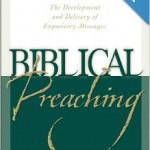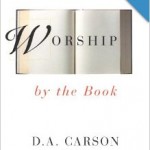I love to read. By God’s grace I am a pretty fast reader; I usually read a couple books each week. I find it helpful to summarize my thoughts on each book and I offer those thoughts in hopes that you will be encouraged to either read or pass over the given title.
 Biblical Preaching: The Development and Delivery of Expository Messages by Haddon Robinson. This is a book eminently worthy of consideration. Preachers looking for a theological defense of expository preaching will have to turn to Peter Adam or John Stott. Yet, the lack of substantive theological meat does not mean that a feast cannot still be had. There is undoubtedly a place for extended rumination on the practice of preaching; it’s development and delivery. Robinson’s work is indeed a landmark contribution to this field. His emphasis on clarity in exposition is a timely and timeless concentration. It was the apostle himself who asked the Colossians to pray that he would make clear the mystery of the gospel, for that “is how I ought to speak” (Col. 4:4). Young preachers and old preachers alike need to be consistently confronted with the imperative of clarity in preaching, and this book will challenge and encourage unto that end.
Biblical Preaching: The Development and Delivery of Expository Messages by Haddon Robinson. This is a book eminently worthy of consideration. Preachers looking for a theological defense of expository preaching will have to turn to Peter Adam or John Stott. Yet, the lack of substantive theological meat does not mean that a feast cannot still be had. There is undoubtedly a place for extended rumination on the practice of preaching; it’s development and delivery. Robinson’s work is indeed a landmark contribution to this field. His emphasis on clarity in exposition is a timely and timeless concentration. It was the apostle himself who asked the Colossians to pray that he would make clear the mystery of the gospel, for that “is how I ought to speak” (Col. 4:4). Young preachers and old preachers alike need to be consistently confronted with the imperative of clarity in preaching, and this book will challenge and encourage unto that end.
 Worship by the Book edited by DA Carson. I am not sure why it took me so long to read this book, but I glad I finally did. The book largely consists of three chapters articulating worship practices from the viewpoints of an Anglican (Mark Ashton), Baptist (Kent Hughes), and Presbyterian (Tim Keller). These chapters follow Carson’s mammoth first chapter on the construction of a theology of worship. It’s is complex and clunky – he acknowledges as much on page 26 – but careful reading will be immensely rewarded as he leaves few stones unturned in defining worship according to the good book. Being a Baptist I appreciated Hughes chapter, particularly for its simplicity and historical sensibility. I find, overwhelmingly, the most common ground with Keller’s adaptation of Calvin’s liturgy as a via media between “Contemporary Worship” and “Historic Worship.” The inclusion of numerous appendices showing various resources and liturgies each tradition employs only increases the book’s value.
Worship by the Book edited by DA Carson. I am not sure why it took me so long to read this book, but I glad I finally did. The book largely consists of three chapters articulating worship practices from the viewpoints of an Anglican (Mark Ashton), Baptist (Kent Hughes), and Presbyterian (Tim Keller). These chapters follow Carson’s mammoth first chapter on the construction of a theology of worship. It’s is complex and clunky – he acknowledges as much on page 26 – but careful reading will be immensely rewarded as he leaves few stones unturned in defining worship according to the good book. Being a Baptist I appreciated Hughes chapter, particularly for its simplicity and historical sensibility. I find, overwhelmingly, the most common ground with Keller’s adaptation of Calvin’s liturgy as a via media between “Contemporary Worship” and “Historic Worship.” The inclusion of numerous appendices showing various resources and liturgies each tradition employs only increases the book’s value.
 Does God Desire All to Be Saved? by John Piper. This is definitely more a booklet than a book, as it comes in at 66 pages. Piper doesn’t pave any new ground in the discussion on how a Reformed view of God’s election of people unto salvation is compatible with His desire that all men come to repentance. Instead, Piper puts his usual – and helpful – flair on the discussion. The crux of his argument is found in the following paragraph,
Does God Desire All to Be Saved? by John Piper. This is definitely more a booklet than a book, as it comes in at 66 pages. Piper doesn’t pave any new ground in the discussion on how a Reformed view of God’s election of people unto salvation is compatible with His desire that all men come to repentance. Instead, Piper puts his usual – and helpful – flair on the discussion. The crux of his argument is found in the following paragraph,
The difference between the Reformed and the Arminians lies not in whether there are two wills in God, but in what they say this higher commitment is. What does God will more than saving all? The answer the Arminians give is that human self-determination and the possible resulting love relationship with God are more valu- able than saving all people by sovereign, efficacious grace. The answer the Reformed give is that the greater value is the manifestation of the full range of God’s glory in wrath and mercy (Rom. 9:22–23) and the humbling of man so that he enjoys giving all credit to God for his salvation (1 Cor. 1:29).
Piper’s little work would be a useful resource for pastors discipling church members through this timeless discussion. Download a free PDF here.
 The English Girl by Daniel Silva. This is the latest volume in Silva’s series on Gabriel Allon, the art-restorer and master Israeli spy. I appreciate Silva for being able to write an intriguing storyline void of the salacious content that often dominates the genre. The English Girl‘s narrative wanders at times and felt predictable (it may just be that I’ve read too many of these books to be surprised anymore), but I still enjoyed this modern update of classic Cold War espionage.
The English Girl by Daniel Silva. This is the latest volume in Silva’s series on Gabriel Allon, the art-restorer and master Israeli spy. I appreciate Silva for being able to write an intriguing storyline void of the salacious content that often dominates the genre. The English Girl‘s narrative wanders at times and felt predictable (it may just be that I’ve read too many of these books to be surprised anymore), but I still enjoyed this modern update of classic Cold War espionage.
